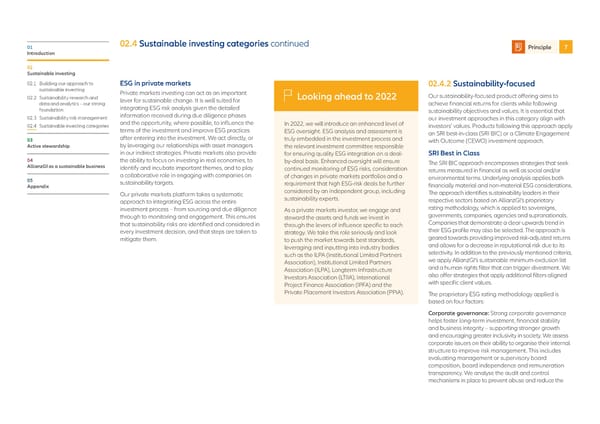01 02.4 Sustainable investing categories continued Principle 7 Introduction 02 Sustainable investing 02.1 B uilding our approach to ESG in private markets 02.4.2 Sustainability-focused sustainable investing Private markets investing can act as an important 02.2 S ustainability research and lever for sustainable change. It is well suited for Looking ahead to 2022 Our sustainability-focused product offering aims to data and analytics – our strong integrating ESG risk analysis given the detailed achieve financial returns for clients while following foundation sustainability objectives and values. It is essential that 02.3 Sustainability risk management information received during due diligence phases our investment approaches in this category align with 02.4 S ustainable investing categories and the opportunity, where possible, to influence the In 2022, we will introduce an enhanced level of investors’ values. Products following this approach apply terms of the investment and improve ESG practices ESG oversight. ESG analysis and assessment is an SRI best-in-class (SRI BIC) or a Climate Engagement 03 after entering into the investment. We act directly, or truly embedded in the investment process and with Outcome (CEWO) investment approach. Active stewardship by leveraging our relationships with asset managers the relevant investment committee responsible in our indirect strategies. Private markets also provide for ensuring quality ESG integration on a deal- SRI Best in Class 04 the ability to focus on investing in real economies, to by-deal basis. Enhanced oversight will ensure The SRI BIC approach encompasses strategies that seek AllianzGI as a sustainable business identify and incubate important themes, and to play continued monitoring of ESG risks, consideration returns measured in financial as well as social and/or a collaborative role in engaging with companies on of changes in private markets portfolios and a environmental terms. Underlying analysis applies both 05 sustainability targets. requirement that high ESG-risk deals be further financially material and non-material ESG considerations. Appendix considered by an independent group, including Our private markets platform takes a systematic The approach identifies sustainability leaders in their approach to integrating ESG across the entire sustainability experts. respective sectors based on AllianzGI’s proprietary investment process – from sourcing and due diligence As a private markets investor, we engage and rating methodology, which is applied to sovereigns, through to monitoring and engagement. This ensures steward the assets and funds we invest in governments, companies, agencies and supranationals. that sustainability risks are identified and considered in through the levers of influence specific to each Companies that demonstrate a clear upwards trend in every investment decision, and that steps are taken to strategy. We take this role seriously and look their ESG profile may also be selected. The approach is mitigate them. to push the market towards best standards, geared towards providing improved risk-adjusted returns leveraging and inputting into industry bodies and allows for a decrease in reputational risk due to its such as the ILPA (Institutional Limited Partners selectivity. In addition to the previously mentioned criteria, Association), Institutional Limited Partners we apply AllianzGI’s sustainable minimum-exclusion list Association (ILPA), Longterm Infrastructure and a human rights filter that can trigger divestment. We Investors Association (LTIIA), International also offer strategies that apply additional filters aligned Project Finance Association (IPFA) and the with specific client values. Private Placement Investors Association (PPiA). The proprietary ESG rating methodology applied is based on four factors: Corporate governance: Strong corporate governance helps foster long-term investment, financial stability and business integrity – supporting stronger growth and encouraging greater inclusivity in society. We assess corporate issuers on their ability to organise their internal structure to improve risk management. This includes evaluating management or supervisory board composition, board independence and remuneration transparency. We analyse the audit and control mechanisms in place to prevent abuse and reduce the
 Allianz GI Sustainability and Stewardship Report 2021 Page 32 Page 34
Allianz GI Sustainability and Stewardship Report 2021 Page 32 Page 34